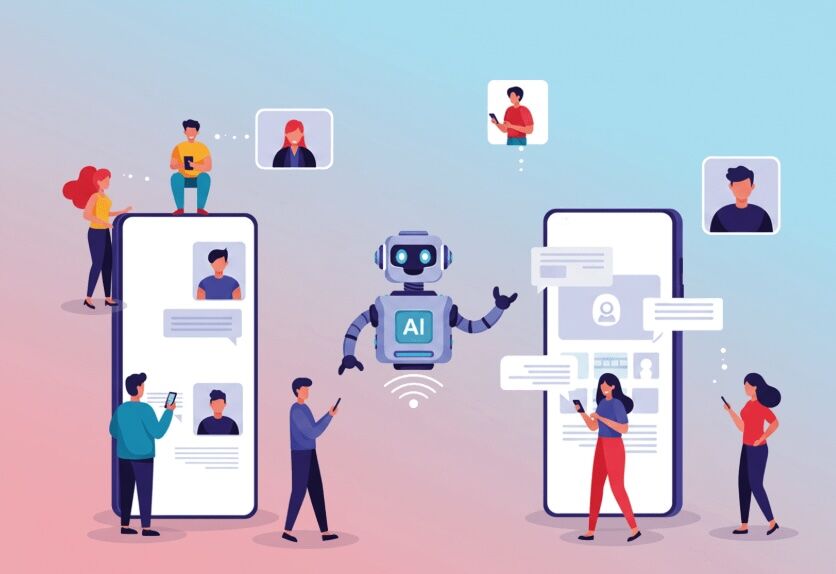How to Own the 2025 Marketing Landscape with AI

Digital marketing is evolving at a fast pace, and that includes the way companies are using Artificial Intelligence (AI) tools to change the game and give their strategies a boost. AI technologies like ChatGPT, Gemini, and similar ones have the potential to revolutionize how we approach marketing, but navigating this new terrain requires knowledge, understanding, and ethics. From the expert marketers at Salem Surround, here’s how you can master the art of AI in marketing.
Learn How to Use the Right Prompts
AI's current capabilities are remarkable, but it takes the right prompts to get the results you want. Many people have given up on AI tools because they don’t like the content they produce. However, if they had only used the right prompts, they would have found their efforts to be far more successful. The key to giving AI tools the right prompts is specificity. AI tools won’t pick up on nuance or subtext, so be extremely clear and specific about what you want.
Here are some tried-and-true prompt ingredients you can drop into your AI requests to get sharper, more on-point results:
-
Action Verbs:
“List,” “Explain,” “Compare,” “Summarize,” “Generate,” “Draft”
-
Length & Format:
“In 3–5 bullet points,” “In 150–200 words,” “As a numbered list,” “With H2 subheadings,” “In a table”
-
Tone Indicators:
“Using a conversational tone,” “In a professional voice,” “With a sense of humor,” “In a persuasive style”
-
Audience Specs:
“For small-business owners,” “Targeting millennials,” “Geared toward C-suite executives”
-
Contextual Hooks:
“Considering 2025 digital trends,” “Based on recent AI advancements,” “Reflecting current consumer behavior”
-
Detail Call-outs:
“Include two real-world examples,” “Cite relevant statistics,” “Use at least one case study”
-
Brand/Persona Cues:
“In the style of [Brand Name],” “As if written by a seasoned email marketer,” “Channeling a witty social-media guru”
Whether you’re approaching a task as an email marketer or a creative copywriter, the context and persona you adopt will shape the AI’s approach and output. For example, if you want a blog post on the most effective digital marketing strategies for the new year, make sure to include exactly what strategies you would like the tool to include, as well as a tone of voice and target audience. All these extra details will help your AI tools create clearer, more specific content that provides more value to your audience.
If At First You Don’t Succeed, Try Again
AI technology is advancing by the day. If you tried an AI tool a few months ago and didn’t find it suitable for your needs, it may be worth your while to give it another try. Because technology advances so quickly, it’s very likely that the tool will now be useful enough to benefit your workflow. For example, early versions of ChatGPT could not search the internet. Now, the tool has a plug-in that will automatically browse the internet as it is generating content. While you still have to fact check the information and check for plagiarism, you won’t have to spend time finding reliable sources yourself.
Learn More About Digital Marketing Strategies
AI is a Tool, Not a Replacement for Human Intelligence
While AI is a powerful tool, it’s important to remember that it’s exactly that, a tool. It cannot replace human creativity and insight, especially when it comes to marketing and creation. That's because the most effective marketing has a specific point of view and a clear goal. Much of the content AI produces is very general, and it only provides a surface-level look at a topic.
Plus, most of the time, AI will write content that is aimed at a very general audience. That’s why it’s so common to see spammy, low-quality content on the internet nowadays. Many companies are using AI as a replacement for content writers, leading to an influx of spam content that most customers are skipping over as they search for something with more substance.
Ethical Considerations and Risks
AI’s potential doesn’t come without risks. Privacy is paramount. Collecting data without consent is unethical and a privacy violation. AI’s predictive capabilities are impressive but not infallible; avoid unrealistic expectations. Many experts use the phrase “garbage in, garbage out” in relation to AI—without clean, accurate data, the output will be flawed. Make sure the AI tool you choose has been trained on reliable information and equipped with an efficient algorithm that can learn from past mistakes.
Source verification is another key area; always fact-check AI-generated content. Even if the tool can search the internet, be sure that you verify the sources. The tool might not be picking up the most accurate or reliable information from the wide world of the internet. The AI tool can make almost anything sound convincing, so don’t give your new article a quick skim and simply move on without checking for inaccuracies. A few minutes of review can save you a major headache later. You are ultimately responsible for the content you publish, even if it was originally produced using AI.
Incorporating AI Into Your Workflow
Wondering how to fold AI into your day-to-day without flipping your entire operation upside down? Try slotting it into bite-sized pieces:
-
Social media automation: Schedule posts, generate hashtags, and pull basic performance reports without lifting a finger.
-
Email personalization: Let AI craft subject lines and tailor snippets based on customer data.
-
Chatbots for support: Handle FAQs, route leads, and gather user info, then hand off to a human when things get complex.
-
AI-powered analytics: Surface trends, flag anomalies, and recommend optimizations in your campaign data.
-
Content ideation & outlines: Brainstorm topics, draft outlines, or generate first-pass copy for blogs and ads.
-
A/B test variations: Quickly whip up headline, image, or caption alternatives to see what resonates.
Start by picking one or two areas that feel most painful or time-consuming. Set clear goals (“Boost email open rates by 10%” or “Cut social scheduling time in half”), choose the right tool for that task, and measure the impact. Small wins add up fast, and before you know it, you’ll have an AI-boosted workflow ready to tackle bigger challenges.
Humans and AI
Remember, AI lacks the human touch, an element that is irreplaceable in marketing. As we progress into 2025, our goal should be to explore AI’s potential and limitations in the marketing world, ensuring that our applications remain impactful, meaningful, and driven by value. AI can inform, enhance, and streamline our marketing efforts, but it is the human element that will continue to define the success of our campaigns. When we use these tools to better our marketing efforts, we can discover new ways to engage our audiences and change the future of marketing for the better.
Create Effective Digital Marketing Strategies with Salem Surround Today
At Salem Surround, we utilize a blend of innovative AI tools along with human creativity and ethical practices to promote your business. Get in touch with us today to learn more about our digital marketing strategies and how we can help your brand get noticed online.



